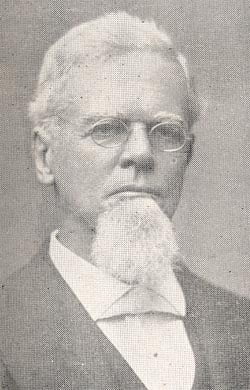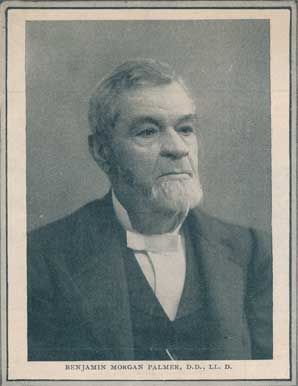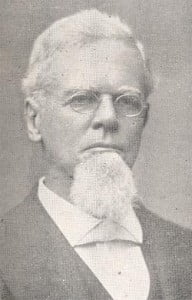 On August 27th, 1820, the Rev. Sylvester Larned appeared for the last time before the congregation of the First Presbyterian Church of New Orleans. He had remained in the city during the summer’s “sickly season.” Death from fever was everywhere, and Rev. Larned has spent those weeks and months ministering to the city’s poor who could not afford to flee the city. It was in that context that “The whole of his discourse was solemn, and he himself was unusually affected by the considerations he presented to his hearers; and as he concluded, he wept.”
On August 27th, 1820, the Rev. Sylvester Larned appeared for the last time before the congregation of the First Presbyterian Church of New Orleans. He had remained in the city during the summer’s “sickly season.” Death from fever was everywhere, and Rev. Larned has spent those weeks and months ministering to the city’s poor who could not afford to flee the city. It was in that context that “The whole of his discourse was solemn, and he himself was unusually affected by the considerations he presented to his hearers; and as he concluded, he wept.”
‘To me to live is Christ; and to die is gain.’ — Philippians 1:21Open in Logos Bible Software (if available).
“To a sentiment like this, my hearers, what can we conceive superior in dignity of thought, or loftiness of feeling? How majestic does he appear who can look with so triumphant an emotion upon the grave,—and that too, not in the sternness of philosophy, nor the torpor of fatalism, but simply in the meek and confiding hope of salvation in Jesus Christ! In the present case, also, there are some facts which render the spectacle still more illustrious. When St. Paul uttered the language of our text, he was a prisoner at Rome. The terrible Nero had hunted long and eagerly for the aged saint, till at last the apostle was seized and conducted to that imperial monster, who had so often feasted on the blood and tears of the Church. Here it was that the godly old man—chained to a soldier, to prevent his escape, uncertain what day might prove his last, and listening, at every sound, for the fearful tread of the executioner,—here it was, under circumstances which might have appalled the stoutest heart, that he exclaimed, more like a conquerer than a captive,
‘To me to live is Christ; and to die is gain.’
Now what, my hearers, is life? It comprises, you well know, two leading ideas—activity and enjoyment. Every man has some great object upon which his activities are more awake than upon any other. Wealth to one, Beauty to a second, Fame to a third, and so on; and, I trust, experimental religion to a few, calls forth that paramount solicitude and exertion which show most decisively in what direction the main current of the feelings is set. By this rule, if you look at the apostle Paul, you may find out, at a glance, the real spring of his movements. His whole efforts were bent to the single aim of promoting Christianity, not only abroad, but in his own bosom—not alone in the display of its external embellishments, but in the urgency of its work upon the affections and thoughts.
The same is true in regard to the idea of enjoyment. There is scarcely a man in a thousand who does not show to the eye of his acquaintances, and indeed to his own eye, if he be candid and impartial, the actual feelings by which he loves chiefly to be engrossed. The secret will come out. The votary of pleasure, of fashion, of gold, and, may I add, of the Saviour, are sure to betray the supremacy of their attachment to their separate objects of pursuit.
By this rule, too, St. Paul appears in a character the most unequivocal. His enjoyments were in Christ. All his views of happiness appear to have centered on the one absorbing principle of union with Him, ‘in whom,’ to use his own words, ‘tho’ now we see Him not, yet believing, we rejoice with joy unspeakable and full of glory.’ Well then did the great apostle of the Gentiles say, that ‘To him to live was Christ.’ But, my brethren, does not his language convey a sentiment of conviction and reproof to you? Could you adopt it, and assert that the Lord Jesus constitutes the primary object of your lives, either by making you supremely active in His service, or by making you supremely happy in His promises?
These are inquiries which lie, depend upon it, at the very basis of personal religion. Easy as it may be to carry about us the semblance of a hope for eternity, the Bible declares that God looketh at the life, not simply in its visible conformities and observances, but in the entireness of its dedication to Jesus Christ. But the venerable Paul goes on to say, that ‘to him to die was gain.‘ How is this? How should a poor frail mortal, who had known only one world, feel a confidence so strong in approaching the untried scenes of another? The reason, my hearers, plainly was, that he had an interest in the Saviour’s blood.
This inspired his triumph, and having this, Death, was to him, as it is to every believer, a subject of thanksgiving and praise. It released him from all his sorrows; and many a one have the children of God in walking through this vale of tears. The hand of God’s bereavement, or the reverses of His Providence, break in upon their happiness so often, that, ‘if , in this life only, they had hope in Christ, they were, of all men, most miserable.’
And besides, in entering the grave, the Christian leaves his sins behind him; and I know of no one consideration more glorious or more animating to a renovated heart. Certain it is, that by just how much we are assimilated to the Redeemer, by just so much will the bare danger of violating his commandments, or incurring his displeasure, be to us a source of the most lively uneasiness and anxiety.
And then, more than every thing else, the hour of death, however shrouded for the time in gloom, ushers the experimental believer into a better and a brighter world. To him it is that God has promised ‘an inheritance incorruptible and undefiled, and that fadeth not away.’ The very moment life is gone, the certainty of Heaven comes home to him; and thus it happens that every one, rich or poor, bond or free, who can truly say, with the apostle, that ‘to him to live is Christ’, may say also with the same assurance, that ‘to die is gain.’
And here, my brethren, let me again inquire, if the sentiment of our text do not tacitly imply a reproach—or an expostulation to yourselves? In what sense is it that death, to you, would be ‘gain’?—Death, which will stop you short in your pursuits, and lay you motionless and cold, beneath the lids of the coffin—death, which will put forever beyond your reach the offers of mercy—which will cut short the busy activities of the world, and dismiss you at once to the tribunal bar of the Omnipotent God. Justly indeed might St. Paul contemplate these things with joy; for he was prepared to put off his clayey tabernacle. But, to us, the question comes most impressively up, whether we have any evangelical and well-grounded reason to believe that Christ has been formed in us the hope of glory?
“Now, my hearers, in looking at the subject which has been briefly examined, I cannot repress a remark, adapted, I think, to the serious reality of our present circumstances. It is this: At all times a becoming preparation for eternity presents itself to us as a most desirable attainment—but now more than ever, for the simple reason that now the distance between time and eternity seems to be most solemnly short. You can all attest how suddenly a few weeks past have hurried some of our fellow-beings from health to the tomb. Do not, however, mistake my meaning,—do not think I say this with a design to alarm. By no means. Your own good sense will teach you, that at a moment like the present, composure and tranquility, even without religion, ought carefully to be sought. But what I say is, have an interest in Jesus Christ. Then death will have no terrors, and the grave no victory.
Brethren, my heart’s desire and prayer to God for you is, that you may be saved. Why will you put off the business of your immortal souls? Why will you rush forward with the infatuation of madness and the rashness of despair, when the arms of a compassionate Saviour are thrown open to welcome you with all your sins and all your fears? I entreat, and God grant you may remember the appeal—I entreat you to be up and doing—to work while it is called today, because the night cometh,—and how soon or suddenly we know not,—wherein no man can work.”
———
By the exertions of this Sabbath he appeared to be much overcome, but complained of no indisposition until early the next morning, when he was seized with fever, which no medical skill or appliances could subdue; and on Thursday evening, the 31st of August, the very day on which he completed his twenty-fourth year, he resigned, in the full confidence of a blessed immortality, his soul to God.
To read more of the life of the Rev. Sylvester Larned, along with a small collection of his sermons, click here :
Life and Eloquence of the Rev. Sylvester Larned; first pastor of the First Presbyterian church in New Orleans, by Ralph Randolph Gurley (1844).
 Mallard, Robert Quarterman 09/07/1830-03/03/1904 PCUS MD42.428; Stacy, History of the Midway Cong. Ch., p. 124;
Mallard, Robert Quarterman 09/07/1830-03/03/1904 PCUS MD42.428; Stacy, History of the Midway Cong. Ch., p. 124;


